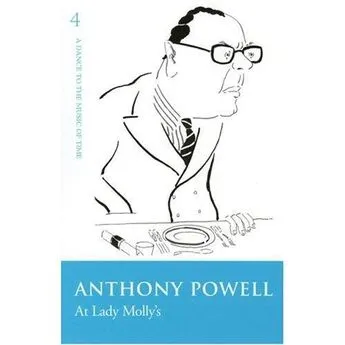Anthony Powell - At Lady Mollys
- Название:At Lady Mollys
- Автор:
- Жанр:
- Издательство:неизвестно
- Год:2005
- ISBN:нет данных
- Рейтинг:
- Избранное:Добавить в избранное
-
Отзывы:
-
Ваша оценка:
Anthony Powell - At Lady Mollys краткое содержание
A Dance to the Music of Time — his brilliant 12-novel sequence, which chronicles the lives of over three hundred characters, is a unique evocation of life in twentieth-century England.
The novels follow Nicholas Jenkins, Kenneth Widmerpool and others, as they negotiate the intellectual, cultural and social hurdles that stand between them and the “Acceptance World.”
At Lady Mollys - читать онлайн бесплатно полную версию (весь текст целиком)
Интервал:
Закладка:
There could be no doubt now that the matter which worried, or at least unusually preoccupied, Mrs. Conyers was connected with her sister’s arrival. I could not at first decide exactly what had upset her.
‘This is not the first time you have met him — the fiancé?’
‘As a matter of fact, I haven’t seen him yet,’ she said, almost apologetically, as if that was the least I could expect of her. ‘You see, it only happened yesterday. That was why Lady Molly arranged the dinner. She didn’t seem to mind their not turning up in the least. Of course, she is much more used to people changing their arrangements than I am.’
It seemed probable that she was merely suffering some anxiety regarding the potentialities of the man who was to be her sister’s third husband. I knew enough about the reputation of Mildred Blaides to realise that anxiety was reasonable enough.
‘He is a good deal younger than Mildred,’ she said.
After announcing this fact, Mrs. Conyers decided to abandon the subject, perhaps fearing that in her own overwrought state she might say too much. She gave a sigh.
‘If I must talk French,’ she went on, with rather forced gaiety, ‘I do so much prefer not to have to talk the language to a Frenchman. They are so terribly severe. I always tell them that they will never admit that any other Frenchman speaks correct French, so how can they possibly expect me to do so. That young man over there actually complimented me on my French accent.’
‘Who is he?’
‘From one of the Balkan Legations. I think his father was Minister over here, and used to stop at Dogdene. He was invited about rather more than you might expect because he was an unusually good shot. In the end the poor fellow was shot himself by an anarchist in his own country. The son had news of Prince Theodoric. In fact, I think he has just ceased to be a member of the Prince’s personal household. As you probably know, Theodoric was rather a special friend of the divorced wife of Lady Molly’s brother, Lord Ardglass, who died some years ago. Our hostess always likes to hear about him on that account. Between you and me, I am afraid she is a tiny bit of a gossip, but don’t say I said so.’
Mrs. Conyers smiled a little slyly.
‘Who are the two girls who have just come in and are talking to Chips Lovell?’
‘He is the young man you arrived with, isn’t he? The nearest is one of the Tolland girls, Priscilla, I think. She was going to see a film with a former school friend of hers whose name I was not told.’
Priscilla Tolland looked more than seventeen: even so, she had not entirely lost a long-legged, childish awkwardness in the manner in which she stood with her legs crossed. I could see she bore a strong likeness to the ‘dotty’ Blanche, though certainly free herself from any such disability. The girl with her, prototype of all school friends, was small and dark with horn-rimmed spectacles and an air of bossing everyone about. I thought I would have a word with them in a minute or two; when Mrs. Conyers had finished speaking of the misty past, into which she was now making a deep excursion. However, opportunity to approach the girls never came, because a second later, just as Mrs. Conyers had invited me to tea with herself and the General the following Sunday, two more persons, a man and woman, entered the room.
‘Ah, there is Mildred at last,’ said Mrs. Conyers, fumbling with her lorgnette, her thin hands, almost pale mauve in colour, shaking with excitement and anxiety.
I myself was curious to see what Mildred Blaides — or rather Mildred Haycock — might look like after all these years, half expecting her to be wearing her V.A.D. outfit and smoking a cigarette. But when my eyes fell on the two of them, it was the man, not the woman, who held my attention. Life is full of internal dramas, instantaneous and sensational, played to an audience of one. This was just such a performance. The fiancé was Widmerpool. Scarlet in the face, grinning agitatedly through the thick lenses of his spectacles, he advanced into the room, his hand on Mrs. Haycock’s arm. He was wearing a new dark suit. Like a huge fish swimming into a hitherto unexplored, unexpectedly exciting aquarium, he sailed resolutely forward: yet not a real fish, a fish made of rubber or some artificial substance. There was something a little frightening about him. That could not be denied. Molly Jeavons, this time supported by her husband, closed in on these new arrivals immediately.
‘Well, he is no beauty,’ said Mrs. Conyers.
She spoke with such deep relief at her discovery of the unpleasingness of Widmerpool’s features that she must have feared the worst of her sister’s choice on account of the reported difference of age. Probably she had pictured some golden-haired gigolo of altogether unacceptable personal appearance. The truth was a great consolation to her. Certainly, to look at them, they seemed on the score of age to be a couple very reasonably to be associated together. Mrs. Haycock was in the neighbourhood of forty, and looked no younger, but Widmerpool, although only a year or so over thirty, had always appeared comfortably middle-aged even as a boy.
‘I know him.’
‘Who is he?’
‘He is called Kenneth Widmerpool. I was at school with him as a matter of fact. He is in the City.’
‘I know his name of course. And that he is in the City. But what is he like?’
Mrs. Conyers did not attempt to conceal her own impatience. The reason of her anxiety was now made plain. She had no confidence in her sister’s choice of husband. She wanted to know the worst as soon as possible. Her first, and most serious, fears were passed; she wished to move on to a later stage of enquiry. Widmerpool, although giving her reason to be thankful that the outlook was not more threatening, had evidently made no very captivating impression.
‘Is he nice?’
‘I’ve known him a long time ‘
By then we were both involved in general introductions taking place round the room, so that I was not forced to answer the question. Afterwards, when I got home, I pondered what I should most properly have said in reply. The fact was that Widmerpool could hardly be described as ‘nice’. Energetic: able: successful: all kinds of things that had never been expected of him in the past; but ‘nice’ he had never been, and showed little sign of becoming. Yet, for some reason, I was quite glad to see him again. His reappearance, especially in that place, helped to prove somehow rather consolingly, that life continued its mysterious, patterned way. Widmerpool was a recurring milestone on the road; perhaps it would be more apt to say that his course, as one jogged round the track, was run from time to time, however different the pace, in common with my own. As an aspect of my past he was an element to be treated with interest, if not affection, like some unattractive building or natural feature of the landscape which brought back the irrational nostalgia of childhood. A minute later I found myself talking to him.
‘No, I haven’t seen you for a long time,’ he said, breathing heavily as usual, ‘I’ve been trying to get hold of you, as a matter of fact, to tell you I was getting married.’
‘Many congratulations.’
‘Time to settle down,’ he said.
This remark was fatuous, since he had never been anything but ‘settled down’, at least in my eyes. I could not imagine why he should specially wish to tell me about his marriage, although there could be no doubt from his manner that he was in a great state of excitement at the thought of being engaged. His nose and lips, beneath the huge headlamps of his now rimless spectacles, were twitching slightly. Lunging out towards Mrs. Haycock, who stood not far from him, he seized her arm and drew her in our direction.
‘This is Nicholas Jenkins, my dear. An old friend of mine. He was somewhat my junior at school.’
Mrs. Haycock, who had been talking to her sister, now turned and faced me, so that for the first time since she had entered the room I had an opportunity of observing closely the woman he hoped to make his wife. I could at once appreciate the strong impression she might have made on him the moment she showed herself prepared to accept him as an admirer. Tall, elegant, brassy, she was markedly of the same generation as Molly Jeavons, without personally at all resembling her. Mrs. Haycock’s moral separateness from Widmerpool, immediately noticeable, was not on account of any difference of age, as such, for — as I have said — Widmerpool had never looked young. It was a separateness imposed upon her by the war. Like Jeavons, that was the epoch to which she belonged by some natural right. Life on the Riviera had no doubt left its mark too: a society in which Widmerpool was unlikely hitherto to have participated. She retained some of her sunburn from the previous summer, and, although dressed quite normally — indeed, rather well — her clothes seemed in some indefinable manner more adapted to a plage or casino than the Jeavons drawing-room.
I had always felt an interest in what might be called the theoretical side of Widmerpool’s life: the reaction of his own emotions to the severe rule of ambition that he had from the beginning imposed upon himself: the determination that existence must be governed by the will. However, the interest one takes in the lives of other people is, at best, feeble enough, so that, knowing little of his affairs in recent years, I had in truth largely forgotten about him. Now, for the second time that evening, I recalled the night when that noisy little girl, Barbara Goring, had poured sugar over his head at the Huntercombes’ dance. He had been in love with her; and I, too, for that matter, or had thought so at the time. Then there had been his brief, painful association with Gipsy Jones, the grubby Left Wing nymph, whose ‘operation’ he had defrayed unrewarded. After the Gipsy Jones business, he had told me he would never again have anything to do with a woman who ‘took his mind off his work.’ I wondered whether Mrs. Haycock would satisfy that condition: whether he had proposed to her under stress of violent emotion, or had decided such a marriage would help his career. Perhaps there was an element of both motives; in any case, to attempt to disengage motives in marriage is a fruitless task. Mrs. Haycock took my hand, smiling absently, and gave it a good squeeze; the clutch of a woman pretty familiar with men and their ways.
‘One always has to meet such crowds of people when one gets married,’ she said, ‘It is really too, too exhausting. Did you say we had met before? Was it at Cannes? I seem to know your face.’
She spoke breathlessly, almost asthmatically, in which she resembled Widmerpool, but using that faint hint of cockney, an accent in part bequeathed by the overtones of the Prince of Wales to the world to which she belonged. I tried, quite unsuccessfully and perhaps not very tactfully, to explain the circumstances of our infinitely distant former meeting. It was plainly years since she had listened to any remarks addressed to her, either serious or trivial, so that perhaps deservedly — for the exposition was a formidable rigmarole upon which to embark at that moment — she swiftly disengaged herself from its demands.
‘I’m absolutely longing for a drink, Molly,’ she said. ‘Oh, thank you so much, Mr. Jeavons, what an angel you are. I have been having the most awful time tonight. You know I abominate making plans.. Never make them, as a matter of fact. I just won’t. Well, this evening I got caught up by one of the most awful bores you ever met.’
She drank deeply of the glass brought by Jeavons, and began telling him the story. Widmerpool took me aside.
Читать дальшеИнтервал:
Закладка:








